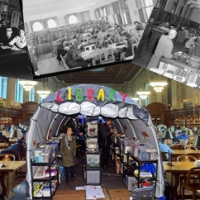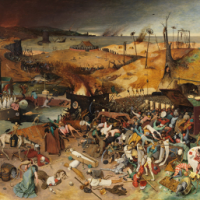So, you’re going to library school…
With summer reaching its conclusion many are eyeing their backpacks in anticipation of the soon to start school year. It is a time of excitement mixed with trepidation for those anticipating the first day of classes and nostalgia blended with slight remorse for those remembering the years past when they were awaiting that first day. It is in this spirit of reflection that one often comes to consider the things that they wish they had known or wish they had learned while in school – and thus, without further ado, what follows is some advice for those about to enter Library School (whether MLS, MSIS, a Bachelor’s program, or something else) based roughly if seriously upon the things that I wish I had learned in library school.
1. Specialize, but stay open-minded
When I entered library school (LS from this point forward) I chose to focus my course work on two specific areas: archives and library technology (digitization primarily). While I kept most of my coursework in the range of these topics – and took internships and jobs that bolstered these skills – my current job (which is definitely a library job) is neither in archives or digitization. Some of this may be fairly blamed on the fact that in my job search I did not only apply to archives and digitization jobs, and to the fact that I accepted a library job that was not based on archives and digitization, but – it seems fairly common to find people working in the areas of librarianship that they had not anticipated.
Furthermore, the type of library work I do was exactly the type that I did not think I wanted to do while working on my degree, but now (to be frank) the idea of doing archival arrangement all day seems like it would be less enjoyable. Much of this is related to the overall challenge of finding a decent library job, a challenge that may lead you to apply for many positions in areas outside of your focus simply because archiving, or digitization, or reference, or public, or systems, or [insert your particular focus], jobs are not particularly plentiful. You’ll probably wind up applying for positions in many areas of librarianship, so it isn’t a bad idea to pick up some of the skills of related areas.
All of which is to say: there is a lot to be said for really honing a set of librarianship skills, but those who want to be public librarians may find themselves working as systems librarians, those who want to work in digitization may find themselves cataloging library books, and those who want to work in archives may find themselves answering reference questions. A year after you finish library school it won’t matter as much what you focused on in school, it will matter what you’re actually doing.
In other words, focus, but mix a little bit of blurriness in at the margins. If you can, try to take one or two courses that deviate slightly from your focus (again, if you can), and if its possible take a job or internship (jobs are better) that will broaden your skill set beyond your specific focus. This may seem obvious, but in many a program the catechism is all about focus, but sometimes it’s worthwhile to watch what’s happening at the margins.
2. Technological Literacy is Information Literacy
Some of those who are drawn to library school, and to the idea of working in libraries as well as similar institutions, may be attracted by the idea of spending days surrounded by old books and documents. There is nothing wrong with such a desire, unless it forms a mental picture in which the librarian/archivist is somehow insulated from technological change. It does not seem to be too contentious a hypothesis to suggest that most librarians use some kind of computer technology on a daily basis in the course of their work; whether it be for searching the catalog, e-mailing patrons and colleagues, helping to staff a “chat with a librarian” program, maintaining websites, building the library’s social networking presence, teaching others computer skills, and the list could easily go on. Furthermore, the preceding list does not take into account tablets, photocopiers, scanners, digital cameras, e-readers, and the host of other technological tools that a librarian will need to have some measure of comfort in using. This tech familiarity is becoming an increasingly sought after skill set amongst new librarians, and it can easily be one that librarians accustomed to technology can overlook.
If many librarians consider one of their roles to be helping patrons to become “information literate” (which requires that librarians be information literate), it is equally important (if generally overlooked) that librarians be able to help patrons become “technologically literate” (which requires that librarians be technologically literate). In changing technological times such as these libraries are a site where a great deal of this change plays out, both in the way that the traditional library is altered and in the way that patrons interact with the library. It is not enough for a librarian to just be comfortable using technology any longer (though this is still important) a librarian needs to have a complex understanding of the way that technology works and impacts society – from their patrons to their institution. A librarian will likely be asked for help a patron with troubleshooting a device (I work in an academic library setting where several patrons have used me as their personal IT department), a librarian may be asked for advice on which type of device to purchase, and a librarian may be expected by some patrons (especially of late) to be able to recommend programs that will protect their privacy. In other words: it’s very useful to learn the basics of writing computer code, but you also need to learn the basics of what computers mean to society.
This is not to suggest that every library school student needs to swear a secret oath to the patron saint of technological criticism General Ned Ludd; though it does not hurt for librarians to know the actual history of the Luddites (seeing as librarians are frequently accused of being Luddites). However, many a library school is a site of technological evangelizing (“technology will save libraries”) worthy of a tech company advertisement, and it’s worthwhile for a librarian to remain somewhat skeptical. Developing and maintaining an interested but critical stance towards technology will assist a librarian in the fulfillment of their duties – for information literacy in a technological society demands technological literacy. This does not mean that library school students need to run out and read every book by Lewis Mumford and Jacques Ellul (although it’s worth doing) – but it does not hurt for a librarian to be familiar with Neil Postman (at least his 6 questions for new technology) or to take the time to read Douglas Rushkoff’s short book Program or Be Programmed.
3. Learn to Organize, Learn to Fight
At the orientation session for the library school I attended the dean stood before the assembled incoming cohort and declared: “I guarantee you will all have jobs upon graduating.” Granted, he did not expressly say “you will all have library jobs” but in that context it was implied. For many of us in the program these words were something referred back to with a certain sardonic humor – people would report recent interesting job postings to others and when somebody applied for and did not get a job it was not uncommon for them to wryly say “but it’s okay, the dean promised us jobs.” A few of us even took to joking that we would start forwarding the dean our student loan bills until we were working. The slight disbelieving response to the dean’s statement largely resulted from what we all knew about the library world: that jobs were not as plentiful as graduates, that libraries were freezing hiring, that many older workers were putting off retirement, and that many of the newly opened library jobs were classified as para-professional positions.
Budget cuts and libraries have been getting to know each other very well these last few years, and if the threat of impending doom is slightly less present, it has not as yet completely dissipated. Cuts are still coming, and even budget restorations will not bring most libraries back up their pre-financial meltdown levels. Obviously this impacts librarians (new and old) as it means that the jobs are not particularly plentiful, but it also means that once hired by a library a librarian may be constantly tasked with finding areas for saving nickels, finding ever more ways to do more with less and after they’ve done that (because they did it so well) they will be expected to do even more with even less.
Library schools try to provide their students with all of the skills that they will need to be successful as librarians. Obviously. And many a library school encourages students to get involved with the appropriate and relevant organizations (ALA, SAA, etc…). And yet library schools are not teaching librarians how to do the things that they will have to do in order to keep being librarians: organize, agitate and fight against budget cuts. Granted, it is not particularly surprising that library schools are not hotbeds of political organizing and activism, as the image of librarians as polite folk who would rather shush a loud patron than yell at a political rally is a mythology that many librarians (and library schools) buy into as strongly as the larger culture. While cuts were mentioned in many of the courses that I took in library school the question of “how do you stop the cuts” was usually met with dull lines about lobbying politicians. Which is not to say that lobbying has no value, but it is not enough.
Those entering the library field need to be ready to fight for it, not just out of a desire to protect their own positions, but because to be a successful librarian one needs to realize that libraries are something for which it is worth fighting. Librarianship in this day and age is an inherently political act. To believe that all people should have equal access to informational resources regardless of race, gender, class, religion, and so forth is an increasingly radical stance in our ever more stratified world and taking a stand against budget cuts should be seen not as a mere budget issue but as part of a larger question of social justice. Likewise to believe that patrons privacy should be respected seems to run counter to current corporate and governmental trends. This is not to say that librarians have a duty to “radicalize” patrons or even to become “radicalized” themselves, but it is important to recognize that libraries are a social oasis in the desert that our society is quickly becoming. Even if it is not always expressed in such terms, defending libraries is about social justice.
What it means to “learn to fight” or “learn to organize” can be a bit tricky to locate exactly, but it can begin with the recognition that being a librarian means at some point one will need to fight for the library’s future. This manifests itself in organizing against budget cuts or even in being able to demonstrate to the leadership of an organization that libraries are of value. And if library school isn’t teaching these skills they are ones that we need to teach ourselves, teach each other, and ones that we need to learn by banding together with other committed individuals. It may not be listed amongst the “upcoming courses” but it is likely that wherever a person is going to library school…people are organizing to save the local library (see: Urban Librarians Unite), and the time to get involved is now, before a new librarian is suddenly thrown –unprepared – into the struggle to save their own library.
One may not get course credit for fighting for the future of libraries, but being involved in that struggle is a credit to every librarian.












Pingback: What I Wish I’d Learned in Library School: Don’t | LibrarianShipwreck
Pingback: ALA CAO Wants Comments | LibrarianShipwreck
Pingback: Libraries – Destruction and Pillage (Canadian Edition) | LibrarianShipwreck
Pingback: Happy Birthday! We’ve been sinking for one year (and counting)! | LibrarianShipwreck
Pingback: Self Help, Mutual Aid, Reference Services – A Sideways Glance | LibrarianShipwreck
Pingback: Librarian is Still My Occupation – Another Epilogue | LibrarianShipwreck
Pingback: Things I learned while working as a reference librarian | LibrarianShipwreck